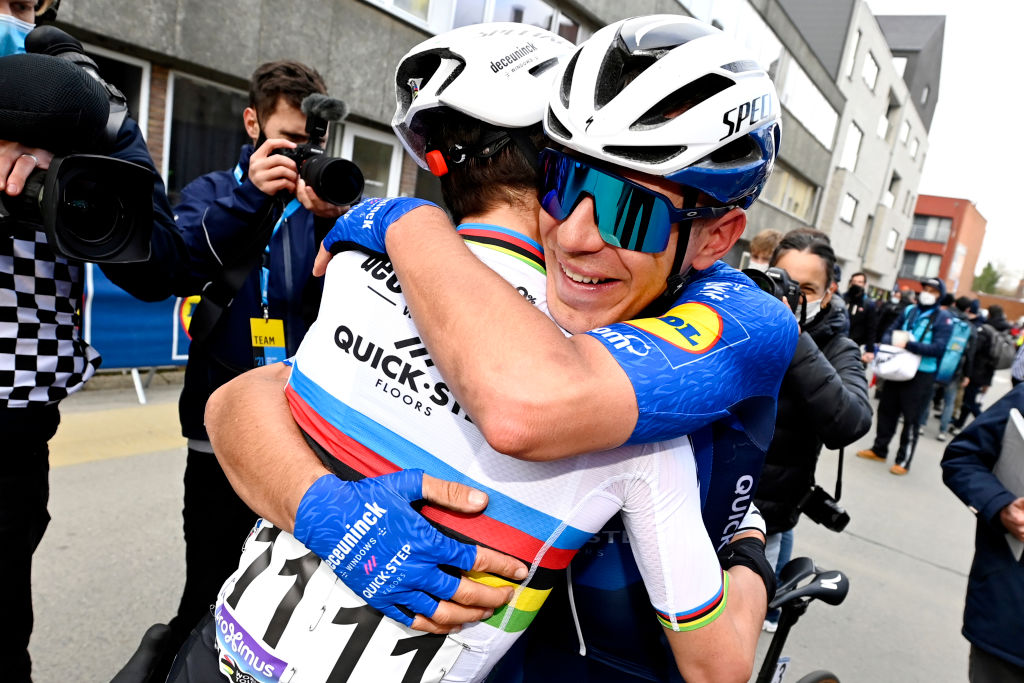Hugging also banned: UCI urges riders to set example in fight against COVID-19
UCI Doctor confident for 2021 season but warns: 'We can’t expect a normal Tour de France this year'

The UCI has called on riders to stop hugging after winning races to set a good example to fans and spectators in the global fight against the COVID-19 pandemic.
After the recent Omloop Het Nieuwsblad and Kuurne-Brussel-Kuurne, winners Davide Ballerini (Deceuninck-QuickStep) and Mads Pedersen (Trek-Segafredo) hugged their teammates and staff in celebration. By Tuesday's Le Samyn races, the Belgian Federation had already asked teams to avoid hugging post-race.
In January, as a wave of COVID-19 cases swept across Great Britain, football players faced similar pressure to set an example in celebrations after scoring a goal. Many struggled to control their emotions but hugs were swapped for fist pumps.
Riders are part of the same protective team bubble, undergo frequent COVID-19 testing, and are protected from close contact with the public. The risk of passing on the COVID-19 virus during a hug is low but UCI Medical Director Professor Xavier Bigard has called on riders to limit their celebrations.
"In my opinion as a doctor, the risk of being contaminated by this behaviour is not very high. However, the message we have to send around the world and to race spectators is that we have to fight this virus and remind people that it is prohibited to touch other people," Bigard said during a webinar presentation of the updated UCI COVID-19 medical protocol.
"When we show some riders congratulating each other and hugging, that’s not a good message for the fans and spectators.
"There is already a ban for riders to hug or touch each other on the podium. Common sense says that riders are also better off showing the same behaviour after the finish line, even if they have just won the race."
The latest race content, interviews, features, reviews and expert buying guides, direct to your inbox!
Bigard worked hard with a number of team doctors and other stakeholders to draw up the UCI COVID-19 protocol so racing could resume last summer. Presenting details of the 2021 document, he highlighted how the risk of new variants of COVID-19 could impact races in 2021.
Under the updated rules, riders and teams will again have to undergo pre-race PCR COVID-19 tests and form a protective bubble at races and in race hotels. Masks and social distancing are required at the start and finish, with strict rules for suspect and confirmed COVID-19 cases. Race organisers have to appoint a COVID-19 doctor, who is responsible for managing any COVID-19 cases at races.
'We can’t expect a normal Tour de France this year'
While a number of races have been cancelled or postponed, most major races are expected to go ahead in 2021 after the rescheduled 2020 season saw a limited number of COVID-19 cases amongst riders and teams.
However, Bigard warned that the spread of more contagious COVID-19 variants and different waves of the virus in different countries will mean crowds will be limited at races and the UCI medical rules must be strictly adhered to.
"I’m confident the season will go ahead," Bigard said.
"The success of the season depends on two points: The seriousness (behaviour) of the team members, the team doctors and the race organisers. Secondly, nobody can say what will happen with the variants in the next weeks and months. However, I can only repeat that we can be confident the cycling season will go ahead."
Despite a roll-out of COVID-19 vaccines in the first part of 2021, Bigard warned that not even the Tour de France in July will not be a ‘normal race’.
"No, we can’t expect a normal Tour de France this year, for several reasons," he explained.
"We expect the new variants will spread into all the European countries and especially in France, even with some strict measures to break the spread of the virus. We cannot expect vaccine protection of the global population before July, August or the end of the summer. So in my opinion, only in my opinion, we can’t expect a normal Tour de France, that’s the case for all the races and for all sport events.
"We have to live with these variants, we can’t expect strict protection from the vaccines for several years and we have to adopt the vaccine, like for the flu virus."

Stephen is one of the most experienced member of the Cyclingnews team, having reported on professional cycling since 1994. He has been Head of News at Cyclingnews since 2022, before which he held the position of European editor since 2012 and previously worked for Reuters, Shift Active Media, and CyclingWeekly, among other publications.